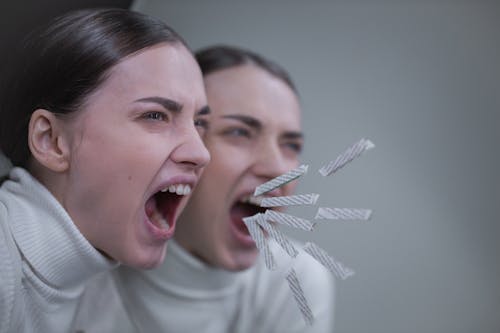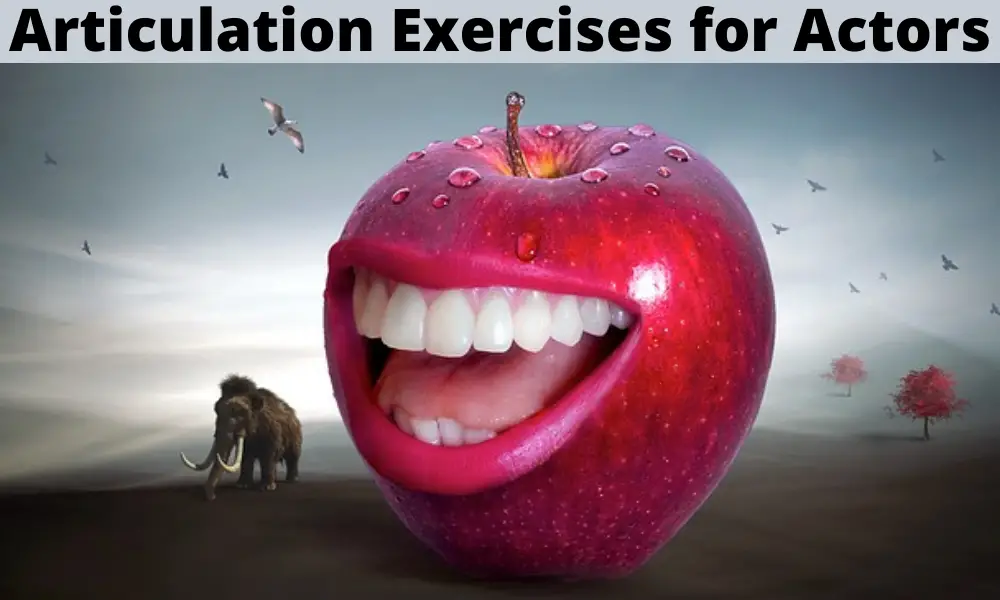Believe it or not, articulation exercises are an important activity that actors should do on a regular basis. Actors bring a play to life by using their voices and words.
They invoke the emotion that exists in a playwright’s lines and create a reality for the audience to enjoy.
Actors, therefore, have to articulate every word, dialogue, and line so that the meaning is clear to the audience.
They have to avoid mispronouncing words, enunciating poorly, and running their words together. Good articulation also involves other qualities like pitch, rate or speaking, volume, and proper breathing technique.
The best way to achieve clear and crisp diction that offers no ambiguity to the audience is by practicing articulation exercises.
While tongue twisters are synonymous with articulation exercises, there are other invaluable exercises like articulator warmups, consonant and vowel enunciations and proper breathing.
What is articulation?

Articulation is the act of speaking clearly and distinctly by using our articulators (tongue, jaw, teeth, lips, and roof of the mouth). Whenever we speak we use our articulators as well as vocal folds and breath in coordinated movements to create the sounds and words that make up our speech.
Speaking clearly or articulating involves creating clear consonants, vowels, and sounds so that letters are not lost within words and our sentences and dialogues are clearly heard and understood by the audience or listener.
Whenever people talk about articulation there are other very commonly associated words that come up such as diction, enunciation, and pronunciation. These words are often used as synonyms for articulation and can be very confusing depending on how they are used and the context around them.
Enunciation and pronunciation are the two main components of articulation.. Pronunciation refers to how you make the correct sound of a particular word according to the rules and patterns of that language.
It focuses on the sounds we use for each letter, the emphasis we put on the different syllables of a word and the process of putting them together to create words and sentences.
For example words that have two syllables are pronounced by stressing the first syllable for nouns and adjectives and the second syllable for verbs.
On the other hand, enunciation refers to the clarity with which we say words. Saying words like “gonna” for I am going to, “didja” for did you or “gimme” for give me are examples of bad enunciation.
Poor enunciation usually results from leaving out sounds, adding sounds and running sounds together which ends up confusing our listeners.
Lastly, diction usually refers to the choice of words that an author or speaker uses to convey a particular tone or attitude to an audience.
In the context of articulation however, diction is a synonym for articulation. It is concerned with clarity and distinctiveness of speech so that each word is clearly heard and understood.
Common articulation problems

Dropping “g” sounds
This is one of the most common examples of poor articulation. People often say phrases like “He’s goin’ to the store” instead of fully enunciating the “g” sound at the end of the word “going”.
Sound the final “g” at the end of your sentences, but be careful to not overemphasize the sound and make it hard like the “g” in grunt.
Skipping plosive sounds
Most people are vocally lazy because they don’t fully engage their articulators when pronouncing words.
For many native english speakers, plosive sounds like /d/, /t/, /b/, and /p/ are another common articulation problem.
People tend to drop or slur letters like /b/,/d/,/p/,/g/, /k/, and /t/ in the middle of words. For example in a phrase like “Succulent and Delicious”, the d on the end of “and”, and at the beginning of “dangerous” tend to merge.
This is an example of poor articulation since the phrase now sounds more like “Succulent an’ Delicious.”
Blending words and sounds incorrectly

This is perhaps the most common form of bad or lazy articulation that a lot of us do on a daily basis. We combine words, syllables and letters in an incorrect manner. Here are a few examples.
“I dunno,” should be “I don’t know.”
“Probly” should be “probably.”
“I am gonna” should be “I am going to”
“Havta” should be “have to.”
“Lib’ry” should be “library”.
“Uzshly” should be “usually.”
A simple solution to avoid lazily combining words is to clearly state each sound that should be included with every word. If you want to shorten phrases make sure to only use correct contractions.
Speaking rapidly
A lot of times when we are either nervous or excited, we end up talking so fast that our words run together and mush into one another. Our listeners can’t figure out where one word ends and another begins.
The faster we speak, our articulation becomes less distinct, and we tend to slur syllables, words and even whole phrases together. For instance, “What are you doing?” becomes “What’cha doin?”
When you catch yourself starting to mumble or run words together, practice slowing down your rate of speech to a more appropriate pace. Speak slowly and pronounce every single sound separately.
Begin by taking a breath between each word. Slowing down your rate of speaking will ensure that you pronounce words fully and stop words and sounds from running together.
Mumbilitis

Another articulation issue that a lot of us are guilty of doing is mumbling. This happens when we speak in a low voice and our words are not crisp and distinct.
Our speech or dialogue as a result becomes unclear to the listener or audience. Mumbling usually happens when you don’t open your mouth enough.
When you’ve got partially closed teeth and lips, syllables don’t come out properly and sounds merge together resulting in poor articulation. It can also be caused by looking down or not maintaining eye contact when you speak ,as well as speaking too quietly or too quickly.
When your mouth is naturally more open, you’ll have more breath support. You’ll have more precise sounds and a relaxed pace when you speak.
Stressing the wrong words
This is a common pronunciation issue where people put emphasis on the wrong words in a phrase.
Incorrect stressing often changes the meaning of a word and as a result our speech becomes confusing and inarticulate.
Inconsistent speaking volume
Have you ever noticed how some people tend to vary the volume of their voice when they talk?
This irregular volume often makes it difficult for listeners to understand you because they might not hear some sounds or words.
A common trend we all do most of the time is to start our speaking with a strong volume and gradually lower it as we delve deeper into our conversation.
We then raise our volume back up again if we notice that the listener is straining to hear what we are saying or towards the end of the dialogue.
One way to solve this issue is by recording yourself reading something out loud. Listen carefully to the tone of your voice throughout the recording. If you vary your volume when you speak, make note of the patterns and practice speaking in a steady volume.
Make a habit of recording yourself 2-3 times a day for a few weeks. In most cases just being conscious of the fact that you have an inconsistent speaking volume is enough to help you stop.
Why are articulation exercises important for actors?

An actor’s speech must be clear and articulate so that the audience can hear every word and understand what is being said.
Audiences cannot pause and replay back a dialogue or speech from a scene to get clarity. It is therefore absolutely necessary to articulate every word and sound as clearly and distinctly as possible.
As an actor your voice and your words are the primary medium through which you communicate with viewers.No matter how great the story or your performance, if your audience can’t understand what you are saying your message gets lost.
Several tv shows and movies have been criticized by audiences where the conversations and dialogues were mumbled and difficult to understand. Shows like Taboo, To Walk Invisible, Transparent, and movies like Walk the Line are some examples.
Strong diction is even more important for stage actors and voice actors. If you are acting on a theatre stage your voice has to be strong enough to be heard by the audience, especially those sitting at the back of the theatre.
You also have to be able to portray a range of different emotions by having a versatile voice. Having strong breath control is also critical for an actor because you don’t want to run out of air and power halfway through a sentence.
You have to ensure that the sound you produce when speaking is supported by a steady air supply. This way you are able to deliver your lines in a sustainable and articulate manner.
The best way to have good articulation is to practice articulation exercises regularly and especially before performances.
Articulation exercises help strengthen and stretch the muscles of your articulators which are involved in making speech.
Furthermore they bring to your attention bad habitual speech patterns which you need to work on and improve. Articulation exercises are especially handy whenever you are performing classical works such as Shakespeare, Eurypides, and Molliere.
The language and phrasing in classic works is quite challenging and vastly different from how we speak nowadays. It’s therefore very easy to be inarticulate while performing such pieces if you don’t work on your diction as part of your preparation.
Articulation exercises like tongue twisters also help actors master their breathing and develop stamina so that they don’t run out of breath in the middle of a sentence and end up mumbling.
Vocal qualities of articulation

Resonance
Resonance is the quality or intensity of your tone when you speak or sing. It is created when the sound waves strike your vocal cords and reverberate.
The human voice, similar to acoustic musical instruments like the guitar, trumpet or violin, has its own chambers where it resonates the tone. The main chambers include the chest, throat (pharynx and larynx), mouth, and nose.
The larynx is the first place where resonation happens. This is where your exhaled breath transforms into a sound wave as it passes over the vocal folds.
The next vocal resonator is the pharynx or the passageway connecting your nasal cavity and larynx. To increase the resonation in your pharynx, lift the soft palate in your mouth.
One of the most important resonators is the mouth which gives your tone a conversational or casual quality. To create more space and resonance in your mouth, relax your tongue and keep it flat and down.
Shaping your lips is critical for good articulation just before you release the sound from your mouth.
Nasal resonance is used to produce the m, n, and ng sounds in the English language. It gives your tone a bright and edgy quality and overtones that help in clarity and projection. To produce nasal resonance you have to lift up your soft palate.
Too much nasal resonance is not a good thing as it produces sounds that are thin and high pitched which irritate most people.
On rare occasions however, nasality can be part of your character’s identity. A good example is the character “Janice” from the popular tv show Friends played by Margaret Emily Wheeler.
Chest resonance is where low vibrations are made. Whenever you speak in a deep voice you will feel a rumble or resonance in your ribcage. Chest voice gives your voice a feeling of depth, power, warmth and sensuality.
An actor must have a well developed instrument which enables them to produce sound with very little physical effort. The best way to practice resonance is to hum with an open and relaxed throat.
Pitch

Pitch is the highness or lowness of the voice. It is determined by how quickly or slowly the vocal fold vibrates.
Everyone has a natural pitch level from which their voice travels up and down. Children have the highest pitched voices, and women’s voices have a higher pitch than men.
The pitch we use to talk provides meaning to our speech. For example we use a higher pitch to emphasize certain words when we are excited, interested, or enthusiastic.
In contrast, we use a lower or regular pitch when speaking words that don’t need emphasis.
Pitch also plays an important role in acting. Knowing when and how to change your pitch, and for how long is an important speaking skill that actors need to master.
For instance, in a dialogue or a soliloquy actors raise their pitch in moments where conflict is building up and excitement or comedy is happening.
This helps to draw in the attention of the audience to important or exciting parts of a performance. In contrast, actors will play the rest of the play in a lower or regular pitch.
People vary their voice when they speak which gives rhythm and a musical quality to their voice which makes it interesting to listen to. Variation in pitch is called inflection.
If people don’t inflect when they speak their speech ends being monotone. Monotony is a bad quality for a speaker or actor because speaking on one level without any variation is extremely boring and hard to pay attention to.
Thus observing and understanding how different people use inflection to express different thoughts and emotions is crucial information that actors need to be aware of.
If you observe carefully you will notice that in general,dominant people use falling inflections while timid people use brief rising inflections. People use rising and falling inflections to express subtle thoughts and emotions like sarcasm or sneering. While angry people use a higher pitch.
Tone

Tone is the emotional quality or color of a voice. We usually use tone together with pitch when we speak. Vocal tones can be dark, sharp, bright and warm. Sharp tones are usually used when we criticize or chastise someone.
On the other hand we often use warm tones to soothe someone in pain or when bonding with them. A lot can be communicated just by the tone of a voice, even when the words can not be heard.
Tone is especially important in acting. When acting a scene you have to identify the emotion of your character and use the right tone of voice to express their feelings.
The pause
Taking a few seconds to pause and replenish our breath supply is an important part of speaking. However, a lot of new actors and speakers run out of breath in the middle of a thought or sentence.
This is a bad practice because it interrupts the flow of thought in your speech and makes you seem inarticulate. It’s best to take a brief pause and breathe in after a full stop or comma.
This means you have to practice catching your breath between groups of thoughts.The number of words per group varies with the thought, but it is typically four or five.
Make sure to avoid too many breath groups as they tend to make your speech choppy. Punctuation is a great guide to help you determine when to pause and take in some air.
It can also help clarify meaning, as well as the relationships between certain grammatical elements.
A pause is however more than just a moment of silence between different thought groups. It often acts as an indicator that whatever you are about to say is quite important. It is a great tool for creating dramatic effect, by building tension and curiosity in the audience.
Volume

Different volumes are used to demonstrate a range of emotions and situations. A loud voice
could be used to express anger or excitement while fear might be conveyed with a quiet voice.
Good actors are able to project their voices well while staying connected to the emotional truth of their characters at the same time. It’s important to understand the distinction between volume and loudness.
Volume depends on the pressure with which air hits the vocal cords .The best way to project your voice and increase its volume is by using diaphragm breathing.
Explosive force is created by a sudden sharp intake of breath and then expelling the air suddenly. It can be used in commands, shouts, laughing, and screaming.
On the other hand, slowly released breath pressure creates expulsive force. Expulsive force is created with a slow release of breath. This type of force is useful for reading long passages without losing your breath and for building climax.
Rate of speech
Rate is the speed at which words are spoken. It is important in speech because it suggests ideas and emotional states.
The rate of speech differs for each person. People speak faster in their everyday conversation than they do when they give a lecture or perform on stage.
Speeches that are informative have a slower speed than those that are persuasive. Speeches with important information should be delivered more slowly to impress the audience.
Importance of breathing for articulation

Breathing is incredibly important for an actor. If you run out of breath in the middle of a dialogue, your words will trail off and lose their impact. Breath is also vital in creating volume in your speaking voice. It supports the sound you make and enables it to carry across a stage or set.
Breathing for speech is a bit different from regular breathing. When breathing while speaking we inhale for a short period of time and exhale in a slow controlled manner for a longer duration.. In regular breathing however, we inhale and exhale for the same length of time.
The proper way to breathe when speaking is to inhale through the mouth which makes it easier to inhale quicker than you can with your nose. When exhaling you want to have a sustained and controlled expulsion of air so that it adequately supports your speech and tone. Controlled breathing is an important skill that actors should get good at.
Without control of the breath the speaking voice may sound winded or weak and proper vocal variety may not be achieved. If you are breathing shallowly by simply expanding the lungs, the breath will remain unsupported and the speaker will not have the capacity to express longer units of thought.
The proper breathing technique you want to use when speaking is belly breathing or diaphragm breathing. When you inhale, the diaphragm contracts, pulling downwards to increase the volume of the chest and air flows into the lungs. The diaphragm relaxes when you release air and sound, helping you control the output of air.
Diaphragmatic breathing will also help the speaker strengthen their voice so as not to speak too much from the throat. Throat speaking will create a hoarse and weak vocal production that will quickly tire the voice.
You can check if you are breathing properly by putting one hand on your belly and one on your chest while you are breathing. The hand on your chest should stay still while the hand on your belly should move outwards when you inhale and inwards when you exhale.
The amount of air you inhale and how you exhale it, determines whether your voice is nasally, pleasant, or grating. If you don’t take in the proper amount of air when you inhale, you run the risk of running out of air in the middle of a sentence. This is also known as vocal fry. It usually happens when you are nervous or stressed, which causes your muscles to tense up and results in shallow breathing.
When your breathing is shallow your lungs don’t take in sufficient air to enable you to reach the end of your sentences or phrases. As a consequence your voice becomes raspy, doesn’t have enough volume and projection and your speeches end up being inarticulate.
Controlling how you exhale is a crucial skill you need to develop to improve your articulation and maximize the potential of your voice. Articulate actors and speakers control their exhalation effectively allowing themselves to still have breath at the end of their speeches and dialogues.
When you exhale the air should flow out in a steady stream accompanied by your words. Avoid pushing or forcing out your exhalation as this will result in your voice having a punching quality.
So when you are in a conversation, practice breathing out slowly while speaking and allow your voice to resonate with a full sound.
Breathing tips for good articulation

Increase your lung capacity
Practice saying the alphabet on a single exhalation. You will probably run out of air before completing the alphabet on your first few tries. Your aim should be to eventually say the whole alphabet in a single out-breath and still have a little bit of air left at the end.
If you want a more challenging exercise practice saying the Announcer’s Test in one breath. You can find it towards the end of this article.
Maintain good posture
Just like breathing, your posture plays a major role in the clarity of your speech. We produce our best voice when our body posture is erect yet relaxed.
Your spine should be straight and your weight should be evenly distributed across your shoulders and back.
Stand with your feet shoulder-width apart and make sure your shoulders are backShoulder rolls and standing side bends are great exercises that can help you have correct posture.
Breathe at punctuation marks
Use the punctuation in your text to let you know when to breathe. This is important because it lets the audience get a better understanding of your character’s thoughts.
If you breathe where there is no punctuation your dialogue is at risk of losing clarity.
Avoid nasality
If you don’t take in sufficient amounts of air when you inhale, your tongue will tend to bunch up at the back of your throat. This will restrict air from entering through the mouth and force it to flow in through the nose instead making your voice nasally.
The /m/, /n/, and /ng/ sounds are the only sounds that come through the nose. Now put your fingers on the side of your nose and say some words that do not have an /m/, /n/, or /g/. If you feel your nose vibrate you are not taking in enough air before speaking. Working on taking enough air before speaking will resolve this issue.
Best ways to perform articulation exercises

Use a mirror
A great way to practice articulation exercises is to practice them in front of a mirror. Most of us have no idea how we look when we speak. By looking at yourself while speaking you will see how your mouth and other articulators move. When you enunciate your words properly your articulators move in a particular way.
For instance when you say the words that start with the letter /b/ like “big” or “bolster” your lips will jut out slightly. Words like “welcome” and “sheep” will stretch your lips wide simillar to a a smile.
Practice your vowel sounds, consonants, and tongue twisters while watching yourself speak in front of a mirror. Pay attention to the shape of your mouth, jaw, and tongue as you practice. Slow down your rate of speech and exaggerate your facial movements.
When you come across words you can’t articulate, observe how your face and articulators move when you say them. Now find someone who can articulate the words you have difficulty with and emulate their facial and articulator movements.
Even spending as little as 5 minutes per day, watching yourself doing diction exercises will help you become conscious of the way you speak and improve your articulation.
Monitor your speech
Get a fellow actor, friend or family member to give you feedback on your articulation and speech. When performing a script or play you want to focus on your material and performance without worrying about your diction at the same time.
Thus it’s more objective and easier for somebody else to monitor your speech and point out your bad speaking habits than doing it yourself. Let them tell you if you are dropping your consonants, speaking in an inconsistent volume or any other articulation mistakes that you may be doing.
After getting their feedback you can then practice articulation exercises to improve your bad diction. Keep working on your exercises and getting feedback from your speech monitor until you have eliminated your articulation problems.
Pencil in your mouth

Another way to practice articulation exercises is by putting a pencil, chopstick or similar material horizontally between your teeth while doing the exercises. Doing diction exercises in this manner makes your tongue and mouth work much harder than usual.
Once you remove the pencil from your mouth and speak normally your speech will be crisper, lighter, and effortless. If you want more of a challenge, you can use a wine cork. Hold it between your front teeth with the majority of the cork sticking out of your mouth.
Articulate before performing
Read your script one more time by yourself just before your performance. Take your time and read slowly focusing purely on articulation and clarity. Enunciate each word as distinctly and crisply as possible. Once you have read your script in this manner go ahead and perform it.
You will notice right away that you sound quite articulate when performing your piece without any conscious effort because you focused primarily on your diction in your previous reading.
Hear yourself
Similar to using a mirror or getting somebody to monitor your speech, this is another way to practice your articulation exercises. Start by recording yourself while having a regular conversation or saying your lines while performing a script.
Listen to the recording carefully and critically. What were your issues in articulating. Were you running your words together, slurring your plosives (/b/, /d/, /p/ and /t/) or dropping your “g’s?
You can also record yourself while doing different articulation exercises to identify which words or sounds your struggle to articulate. Make a list of these words and sounds and tailor your diction exercises to address them.
For example if you struggle with saying the /r/ sound in the beginning and middle of words, you can use this tongue twister — A truly regal rural ruler
Make a habit of recording yourself practicing articulation exercises or reading a scene from a script to monitor your progress. Keep adjusting your exercises to your current articulation problems as you start improving.
Listen to great articulators
Take a break from focusing on yourself and listen to actors with great diction like James Earl Jones, Joanna Lumley, Richard Burton and Morgan Freeman. An easy way to do this is by playing a short clip of the actor speaking and then repeating their speech yourself.
For your first few tries listen to the actor speak first and then say it yourself. As you get comfortable with the speech however try to say the speech directly on top of the speaker. This will also help you with accents and intonation.
Here is an example of great articulation by James Earl Jones from the movie Field of Dreams.
Warmup before doing articulation exercises
Physical warmups
Start by focusing on your posture and bringing awareness to your chest and spine. imagine a piece of string was attached to the top of your head, and was pulling you up towards the ceiling whilst at the same time slowly opening your chest and moving the shoulders back.
The physical warm ups consist of head rolls, hip rotating, and body shake-out. When doing the head rolls, slightly lower your head and move it from side to side. Do this three times and finish by doing three complete head rolls in full circle.
The hip rotation follows a similar pattern to the head rolls. Place your hands on your hips and gently move them from side to side three times. Then rotate your hips in full circles also three times.
Lastly, do the body shake-out by gently shaking out your hands, arms and legs.
Then, flop forwards resting the top of the hands on the floor with slightly bent legs, and carefully bounce your upper body. After several bouncing motions, slowly straighten your legs and body to a standing position.
Hum

Humming is one of the best vocal warmup exercises. It helps stretch the vocal cords, relaxes your facial muscles, and improves breathing. Humming is also an excellent activity for developing your vocal resonance and tone quality.
The tone should emerge from the nasal passages and not the mouth. The basic principle is to resonate the voice with gently closed, but not tight, lips. When humming your articulators, shoulders and neck should be relaxed. To hum:
Start by opening your jaw and gently closing your lips.
Place the tip of your tongue behind your bottom front teeth.
Take a breath and exhale while making a “hmmm” sound.
Change the “hmmm” to “ahhh” halfway through exhaling by opening your mouth.
Hum notes up and down your range while keeping your mouth closed.
Carry the sound through both your nose and your mouth, switching from one to the other as you transition. Hit each note as high or as low as you can.The higher the hum, the more you will feel it in your nose and up in the sinuses and forehead. As you lower the note, the vibrations will sink into your through and resound in your chest.
Repeat this exercise several times. The vibrations generated by the hum help relaxe your face muscles and remove tension that can affect your voice.
Tongue workouts

The tongue is one of the major muscles that enables us to speak. It’s important to give it a nice stretch and exercise before you start working on your diction exercises. A strong and flexible tongue is necessary for good articulation.
Open your mouth and stick out your tongue as far as you can. Hold it steady and straight for 3 to 5 seconds. Relax and repeat 5 times.
Stick out your tongue and try to reach your chin with the tongue tip. Now try to touch your nose with the tip of your tongue. When you stick out your tongue, hold it at the farthest point for 3-5 seconds. Do this 5 times.
Stick out your tongue sideways and try to reach your left ear. Hold at the farthest point for 3-5 seconds. Relax and repeat 5 times. Now try to reach your right ear and repeat the steps.
Open your mouth wide and move your tongue around your lips in a circle as fast as you can.. Make sure your tongue is touching all of your upper lip, lower lip, and corners of your mouth while making a circle. Do this five times in both clockwise and anticlockwise directions.
Draw big circles with your tongue inside your cheek. Make 3 circles each,in both right and left directions.. Don’t forget to do the other cheek.
Place your tongue on the alveolar ridge which is the area behind your top teeth. Open your mouth as wide as possible while maintaining tongue contact. Hold for 3 to 5 seconds. Repeat 5 times.
Put the upper part of your tongue against the back of your lower teeth. Now try to extend the rest of your tongue outward while still maintaining contact with your teeth. You should feel the very back of your tongue stretching along with your jaw and upper throat/neck muscles.
Another excellent exercise you can practice to warmup and exercise your tongue is by repeating the following lines 5-10 times for each letter. Start with the letter D.
da da da
dada dada dada
dadada dadada dadada
Then change the initial sound to: G, J, K, L, N, R, S, T, Y, and Z. Each letter works a different part of your tongue, so make sure to do all the letters for maximum benefit.
Lip trills

Lip trills or lip bubbles warm up the vocal cords and diaphragm, improves breath control, and releases tension in the lips. Doing a lip trill involves making a motorboat sound with your lips, causing them to vibrate rapidly. To practice lip trills:
Relax your lips and cheeks because tight lips will not trill.
Squish your lips together into a loose pucker. To make it easier, use your index fingers to push your cheeks slightly upwards at the corners of your mouth.
Inhale through your nose and quickly exhale out your mouth to make your lips vibrate rapidly. Produce a motorboat sound or “brrr” sound. Hold the sound steady and keep the air moving past your lips.
As your lip trills improve, add sound to them going slowly up and down the scales.
Tongue trills
Tongue trills are similar to lip trills and involve curling your tongue and rolling your “R’s”. They help to relax the tongue and engage your breath and voice. To do tongue trills:
Relax your tongue and place it behind the front upper teeth.
Inhale through your nose and exhale out your mouth. While exhaling, make your tongue vibrate rapidly like when rolling an “R” syllable or imitating a cat purr.
Hold the sound steady for several seconds to warm up your tongue and improve breathing.
As your endurance improves, you can practice your tongue trills for more extended periods of time. You can also vary your pitch, moving up and down the scale while trilling.
Stretch your face muscles

Jaw massage
Put your palms on the sides of your face and slowly massage the jaw and cheek muscles in small circular motions. Start at the point just below your earlobes and stop when you reach your chin. Continue to massage while lowering and raising your jaw. This will help decrease tension in the mouth and jaw area when you speak.
Face stretch
Stand in front of a mirror and stretch all your facial muscles. Open your mouth wide, like a lion roaring. Then scrunch your face up as if you just bit into a sour lemon. Do this 5-10 times. Finish by gently massaging around your eyes, nose and sinus cavities.
Articulation Exercises
Articulation Exercises – Plosive Sounds
Plosive sounds are created when the flow of air is completely obstructed or stopped. This causes the flow of air to build up and release explosively, creating a sharp sound. The 6 plosive sounds or consonants are p,t,k,b,d, and g.
p, t, and k are unvoiced (voiceless) while b, d, and g are voiced plosives. Voiced plosives are made by pushing your breath over the sound. Unvoiced plosives however, don’t use any breath and rely on the mechanics of your mouth movement to create sound.
Plosive articulation exercises help strengthen your lips and prevent your plosive sounds from sounding weak and unclear. Focus on keeping the sound clear, crisp and precise. When you’ve mastered that, try to increase your speed while still maintaining good articulation.
Articulation Exercises – Unvoiced Plosives
Pa Ta Ka Pa Ta Ka Pa Ta Ka Pah
Pa Ta Ka Pa Ta Ka Pa Ta Ka Paw
Pa Ta Ka Pa Ta Ka Pa Ta Ka Poo
Pa Ta Ka Pa Ta Ka Pa Ta Ka Pee
Pa Ta Ka Pa Ta Ka Pa Ta Ka Pay
Articulation Exercises – Voiced Plosives
Ba Da Ga Ba Da Ga Ba Da Ga Bah
Ba Da Ga Ba Da Ga Ba Da Ga Baw
Ba Da Ga Ba Da Ga Ba Da Ga Boo
Ba Da Ga Ba Da Ga Ba Da Ga Bee
Ba Da Ga Ba Da Ga Ba Da Ga Bay
Articulation exercises – Mixed Plosives – 1
Bah dah gah pah dah gah
Boh doh goh poh doh goh
Boo doo goo poo doo goo
Bee dee gee pee dee gee
Bay day gay pay day gay
Articulation exercises – Mixed Plosives -2
When saying the following phrases, focus on exaggerating the plosive sounds by really blasting the air out. This is one of the best exercises for warming up your articulators quickly.
Pat sat flat.
Heat the meat.
Ted had lead.
Bed spread
Pop the top.
Deep sleep
Rob will sob.
Grab a crab.
Kink the link.
Took a look.
Snug as a bug.
Big pig.
Articulation Exercises – Fricative and Nasal Sounds
Mah nah lah thah vah zah
Moh noh loh thoh voh zoh
Moo noo loo thoo voo zoo
Mee nee lee thee vee zee
May nay lay thay vay zay
Watch the video below by voice coach Darren McStay to learn the proper way of doing the plosive and fricative articulation exercises.
Articulation Exercises – Vowel Sounds
The vowel sounds, so important in the quality of your tone, are all made with the lower jaw relaxed. The position of the lips and tongue determines the sound. Say these rhythmically with a breath in between every line.
A (pronounced ah)
ah zah ah zah ah zah ah
bah yah bah yah bah yah bah
cah xah cah xah cah xah cah
dah wah dah wah dah wah dah
E (pronounced eh)
feh veh feh veh feh veh feh
geh the geh the geh the geh
heh seh heh seh heh seh heh
jeh reh jeh reh jeh reh jeh
I (pronounced ee)
kee nee kee nee kee nee kee
lee mee lee mee lee mee lee
mee lee mee lee mee lee mee
nee kee nee kee nee kee nee
O (pronounced oh)
poh joh poh joh poh joh poh
roh hoh roh hoh roh hoh roh
soh goh soh goh soh goh soh
toh foh toh foh toh foh toh
U (pronounced oo)
voo doo voo doo voo doo voo
woo coo woo coo woo coo woo
yoo boo yoo boo yoo boo yoo
zoo oo zoo oo zoo oo zoo
Articulation Exercises – Vowel and Consonant Combination
abt ebt ibt obt ubt
act ect ict oct uct
adt edt idt odt udt
aft eft ift oft uft
agt egt igt ogt ugt
aht eht iht oht uht
ajt ejt ijt ojt ujt
alt elt ilt olt ult
amt emt imt omt umt
ant ent int ont unt
apt ept ipt opt upt
art ert irt ort urt
ast est ist ost ust
att ett itt ott utt
awt ewt iwt owt uwt
axt ext ixt oxt uxt
azt ezt izt ozt uzt
Articulation Exercises – My favorite vocal warmup by Susan Berkley
The sentences below have been specially designed to work all the vowel and consonant sounds in the English language and to warm up the muscles needed for good speech.
Repeat each of these sentences aloud slowly and clearly before you start your day, being careful to pronounce all the vowel and consonant sounds. These are not tongue twisters. Do not rush! If you feel a strain or pain, stop. Gradually work up to reading all the sentences in one sitting.
Eat each green pea. Aim straight at the game. Ed said get ready.
It is in Italy. I tried my kite. Oaks grow slowly.
Father was calm as he threw the bomb on the dock.
An awed audience applauded Claude.
Go slow Joe, you’re stepping on my toe.
Sauce makes the goose more succulent.
Up the bluff, Bud runs with the cup of love.
Red led men to the heifer that fell in the dell.
Maimed animals may become mean.
It’s time to buy a nice limeade for a dime.
Oil soils doilies.
Flip a coin, Roy, you have a choice of oysters or poi.
Sheep shears should be sharp.
At her leisure, she used rouge to camouflage her features.
There’s your cue, the curfew is due.
It was the student’s duty to deliver the Tuesday newspaper.
He feels keen as he schemes and dreams.
Much of the flood comes under the hutch.
Boots and shoes lose newness soon.
Ruth was rude to the youthful recruit.
Vivid, livid, vivifying. Vivid experiences were lived vicariously.
Oddly, the ominous octopus remained calm.
The pod will rot if left on the rock.
Look, you could put your foot on the hood and push.
Nat nailed the new sign on the door of the diner.
Dale’s dad died in the stampede for gold.
Thoughtful thinkers think things through.
Engineer Ethelbert wrecked the express at the end of Elm Street.
Articulation Exercises – Tongue twisters
Tongue twisters are phrases made up of many similar sounding words that are difficult to pronounce quickly and correctly. These exercises strengthen tongue muscles and help with the proper articulation of syllables.
When saying tongue twisters start slowly and carefully. Make sure the start and end of each word is crisp. Repeat the phrase, going faster and faster while maintaining clarity. If you trip over words, stop and start again.
Make sure you stop the air for consonants like ‘t’ and ‘b’. Differentiate between your vowels. Begin by exaggerating each consonant so it is crisp and clear. Make sure the start and end of each word is crisp.
Tongue twisters – categorized by alphabet
A
Ailing Auntie Annie Ames ate
apple butter in abundance.
An agile, angry ape
addled up the avenue.
An ape hates grape cakes.
Anti-inflammatory
Anti-enzymic
Anti-vaccination too
Anthroplasty
Arterial duct
Anti-bacterial blue
What ails Alex?” asks Alice
Andrea and Andrew ate
eight acid apples accidentally
Ann Anteater ate Andy Alligator’s apples,
so angry Andy Alligator ate Ann Anteater’s ants.
Can an active actor always
actually act accurately?
An awful aardvark and an
aching ape ate an antelope
B
Betty Botter had some butter,
But, she said, “this butter’s bitter.
If I bake this bitter butter,
It would make my batter bitter.
But a bit of better butter,
That would make my batter better.”
So she bought a bit of butter –
Better than her bitter butter –
And she baked it in her batter;
And the batter was not bitter.
So ’twas better Betty Botter
Bought a bit of better butter.
Barren Beacon Beckons Bacon Baron
A big black bug bit a big black bear,
Made the big black bear bleed blood.
Blended bloated blinded blight
Bless blink black and blue
Blended bloated blinded blight
Blistering blizzards blew by you
Blitz blast blob and bloke
Blessed blinked bladder and bloat
Blubber blunt blissfully blue
Blistering blizzards blew by you
A black bloke’s back brake-block broke.
Brisk brave brigadiers brandished
broad bright blades, blunderbusses,
and bludgeons—balancing them badly.
Rubber Baby Buggy Bumpers! (Repeat. Increase the tempo.)
Who bit the bold bald bear on the shoulder
on the boulder and made the bold
bald bear on the boulder bawl?
Brian bought brilliant bread in breezy Bristol
A bitter biting bittern
Bit a better brother bittern,
And the better bittern bit the bitter biter back,
And the bittern, bitten
By the better biting bittern,
Said, “I’m a bitten bitter biting bittern,
bitten better now, alack!”
Bad news, Butch! That bike is about to blow!
Wait, Billy Bishop blabbed about us being
backstabbers? Bingo, said you stole the big black-
backed blank bank book. The big black-backed blank
bank book? Yes, by the computer bank that goes
“bleep bloop, bleep bloop”. We didn’t steal the big
black-backed blank bank book. We stole the big
blue-backed blank bank book. Billy Bishop is about
to get beat with a bat! Now bad Bobby Brown wants
both you boys buried for betrayal, and Bobby Brown
built a bike bomb! Bad Bobby Brown bound a bomb
to a bike? Better believe, if the bike goes slow, the
bike will blow! Bike! My booty’s bruised bad.
You may have heard bad Bobby Brown botches bike
bombs. Boy, you best not bet he botched a bomb
beneath my bum! Bomb squad! Bless you! Back up,
boys. Oh boy, bad Bobby Brown bluffed bad.
There is no big black-backed blank bank book.
And this isn’t a bomb, blessedly, it’s just a big blue
bucket of blue blueberries. Badda bing, badda
boom! A big blue bucket of blue blueberries?
Well, seems Billy Bishop blabbing about Butch
backstabbing bad Bobby Brown by stealing his big
black-backed blank bank book backfired, and Bobby
Brown bluffed a bike bomb with a big blue bucket of
blue blueberries.
C/Ch
How can a clam cram in a clean cream can?
If you must cross a course cross
cow across a crowded cow crossing,
cross the cross coarse cow across
the crowded cow crossing carefully.
Cook ‘Cookie’ Turk took Kookie Kirk a turkey cookie.
Give papa a cup of proper coffee
in a copper coffee cup.
Out in the pasture the nature watcher watches the catcher.
While the catcher watches the pitcher who pitches the balls.
Whether the temperature’s up or whether the temperature’s down,
the nature watcher, the catcher and the pitcher are always around.
The pitcher pitches, the catcher catches and the watcher watches.
So whether the temperature’s rises or whether the temperature falls
the nature watcher just watches the catcher who’s watching the pitcher
who’s watching the balls.
Chipp couldn’t chop chocolate chips
’cause Chip chipped his chocolate chip chopper.
Can you can a can as a canner can can a can?
Now Charley is chary when choosing his cheeses
And cheese is a challenge when Charley arrives
When Charley is charming and chooses a cheddar
Then chews it and chips it and chops in some chives
Top chopstick shops
stock top chopsticks.
It’s not the cough that carries you off,
it’s the coffin they carry you off in!
D
Down the deep damp dark dank den.
David tried drying tomatoes daily,
due to Dina’s tremendous diet.
Did Doug dig Dick’s garden or
did Dick dig Doug’s garden?
He wanted to desert his dessert in the desert!
Drunk drugged ducks
Ken Dodd’s dad’s dog’s dead
She was diving into a deep ditch and did a double
flip. Dana deep ditch diving? Wasn’t Dana digging
Doug’s garden? No Dylan digs Doug’s garden, Dana
digs Drake’s garden. Yes, but then she went deep
ditch diving. I drained the deep ditch but didn’t
see Dana. Dudes, don’t despair. Dana didn’t die
deep ditch diving, she was trying to draw drowsy ducks
down by Dairy Queen, downing a dilly bar in her
Dodge Dakota. Dana drawing drowsy ducks? Did
she do drugs? I doubt it was Dana. She doesn’t
do well downing dairy or drawing drowsy ducks.
Dude, don’t you dare doubt me like dat. Dana, after
you did drugs and deep ditch dove, I drained the
deep ditch, didn’t see you, decided you died deep
ditch diving, but a Dodge Dakota and a dilly bar
were driving by DQ, but I doubt it cause don’t you
dislike downing dairy and drawing drowsy ducks?
E
Excited executioner exercising his excising powers excessively.
Eddie edited earl’s easy music
I eat eel while you peel eel.
Edgar at eight ate eight eggs a day.
Did you eever iver ever in
your leaf loaf life
See the deevil divil devil
kiss his weef wofe wife?
No, I neever niver never in
my leaf loaf life
Saw the deevil divil devil
kiss his weef wofe wife.
F
Fresh fried fish,
Fish fresh fried,
Fried fish fresh,
Fish fried fresh.
Fred fed Ted bread
and Ted fed Fred bread.
A flea and a fly flew up in a flue.
Said the flea, “Let us fly!”
Said the fly, “Let us flee!”
So they flew through a flaw in the flue.
Frieda flamboyantly fluttered
to the famous Flower Fair.
There was a fisherman named Fisher
who fished for some fish in a fissure.
Till a fish with a grin,
pulled the fisherman in.
Now they’re fishing the fissure for Fisher.
Five frantic frogs fled
From fifty fierce fishes
Denise sees the fleece,
Denise sees the fleas.
At least Denise could sneeze
and feed and freeze the fleas.
Four poor fools filled four pools full
Foolish Flavius, flushing feverishly,
fiercely found fault with Flora’s frivolity
Frozen Floyd flicks fat fleas for a fixed flat fee
G
Growing gray goats graze
Great green grassy groves
Gobbling gargoyles
gobbled gobbling goblins.
A gazillion gigantic grapes gushed
gradually giving gophers gooey guts.
Green glass grass gleams
As he gobbled the cakes on his plate,
the greedy ape said as he ate,
the greener green grapes are,
the keener keen apes are
to gobble green grape cakes
They’re great!
The great Greek grape growers
grow great Greek grapes.
Eight great gray geese
grazing gaily into Greece
H
Horrible Heidi hears hairy Horace holler.
Hassock hassock, black spotted hassock.
Black spot on a black back of a black spotted hassock.
Heda is hoping to hop to Tahiti
To hack a hibiscus to hang on her hat
Now Heda has hundreds of hats on her hatrack
So how can a hop to Tahiti help that
Harry Houdini hides his
handy hair-raising hobby happily.
In Huron, a hewer, Hugh Hughes,
Hewed yews of unusual hues.
Hugh Hughes used blue yews
To build sheds for new ewes;
So his new ewes blue-hued ewe-sheds use.
Honorificabilitudinatibus
I
Ingenious iguanas improvising an intricate impromptu on impossibly-impractical instruments.
Imagine an imaginary menagerie manager managing an imaginary menagerie.
J
Justin jumping joyous
joined in Johnna’s jubilee.
James just jostled Jean gently.
Jingle jungle jangle joker.
K
Keenly keeping Kate off-keel,
Kurt kicked Katie’s kite.
I saw a kitten eating
chicken in the kitchen.
Come kick six sticks quick.
Kinky kite kits
Little Mike left his bike
like Tike at Spike’s.
L
Red lorry, yellow lorry
Luke Luck likes lakes.
Luke’s duck likes lakes.
Luke Luck licks lakes.
Luck’s duck licks lakes.
Duck takes licks in lakes Luke Luck likes.
Luke Luck takes licks in lakes duck likes.
Lenny Lou leopard led leprechauns leaping like lemmings.
Larry sent the latter a letter later. (Repeat fast)
On a lazy laser raiser
lies a laser ray eraser.
Laura and Larry rarely
lull their rural roosters to sleep.
You’ve no need to light a night-light
On a light night like tonight,
For a night-light’s light’s a slight light,
And tonight’s a night that’s light.
When a night’s light, like tonight’s light,
It is really not quite right
To light night-lights with their slight lights
On a light night like tonight.
Let Letty linger longer
at the luncheon
M
Military malarkey makes monstrous madmen into maligned martyrs.
Too much mashed mushroom makes the meatloaf mealy.
The minx mixed a medicine mixture.
Mary’s matchless mimicry makes much mischief.
N
Naughty nighthawks noisily, narrowly neared Nina.
I like New York, unique New York, I like unique New York.
The next nest will not necessarily be next to nothing.
Noisy knobbly kneed gnome
Had nine nice nieces
Who knocked nine times,
On a nutty knotty knocker.
The nine nice nieces were known to be naughty,
For eighty one knocks
On a nutty knotty knocker
Is a noisy niecy nutty knotty knocker knock
Nine nimble noblemen nibbling nuts.
Any noise annoys an oyster, but a
noisy noise annoys an oyster most.
Nine nice night nurses nursing nicely.
Near an ear, a nearer ear, a nearly eerie ear.
O
Ostentatious over ovens,
Oswald ordered out.
An orange oval spooks
the odd operative
One-One was a racehorse.
Two-Two was one, too.
When One-One won one race,
Two-Two won one, too.
Odious odd odors
overcame Oscar the Octopus.
An oyster met an oyster,
And they were oysters two;
Two oysters met two oysters,
And they were oysters too;
Four oysters met a pint
of milk, And they were oyster stew.
Only royal oily royal oil boils
The cow bowed now at the
slow through the plough
Bow cow wow.
Octopi occupy a porcupine’s mind
P
Pete’s pa pete poked to the pea patch
to pick a peck of peas for the poor pink pig
in the pine hole pig-pen.
Plead Lee’s pleas for peas, please!
Picky people pick Peter Pan Peanut-Butter,
’tis the peanut-butter picky people pick.
Pad kid poured curd pulled cod.
Peter Piper picked a peck of pickled peppers;
A peck of pickled peppers Peter Piper picked;
If Peter Piper picked a peck of pickled peppers,
Where’s the peck of pickled peppers Peter Piper picked
I’m not the fig plucker,
nor the fig plucker’s son,
but I’ll pluck figs
till the fig plucker comes.
Did Dick Pickens prick his pinkie
pickling cheap cling peaches
in an inch of Pinch or framing
his famed French finch photos?
Perspicacious Polly Perkins purchased Peter’s product
And peddled pickles to produce a pretty profit!
A pessimistic pest exists amidst us
Purple paper people
Peter Prangle, the prickly pear picker,
picked three perfectly prickly pears.
Q
The quarrelsome Queen quaffed quickly and quietly.
Quigley Quagmire requested sequentially
created quite quick quality crackers.
The quack quit asking quick questions.
R
Rory the warrior and Roger the worrier
were reared wrongly in a rural brewery.
Rita reads reciting Robert’s
rules to raw rookies.
Round the rough and rugged rock
the ragged rascal rudely ran.
A truly regal rural ruler
Ripe white wheat reapers
ripe white wheat right
Raleigh, are you already ready?
Are you really ready, Raleigh?
Raleigh’s really ready, Riley.
Riley, Raleigh’s already ready!
A real weird rear wheel.
S
Six sick hicks nick six slick bricks with picks and sticks.
Silly senseless sibilance sentences
Separate seagulls from southern semblances
Serious decisions several musicians
Sanctioned songs for soprano mistresses
Supersonic sensitive fences
Suppository savory succulent pittances
Sibilance sounding sibilance causing
Silly senseless Sibilance sentences
The sixth sick sheik’s sixth sheep’s sick.
Seven sleazy shysters in sharkskin suits
sold sheared sealskins to seasick sailors.
Of all the smells I have ever smelt,
I never smelt a smell that smelt like
that smell smelt.
Susie works in a shoeshine shop.
Where she shines, she sits, and
where she sits, she shines.
Squirrels squash squids
Squids squeeze squats
Squawkers squint and squeal
Squealers squabble and squat
A skunk sat on a stump and thunk the stump stunk,
but the stump thunk the skunk stunk.
She sells seashells on the seashore.
The shells she sells are seashells, I’m sure.
And if she sells seashells on the seashore,
Then I’m sure she sells seashore shells.
I slit the sheet, the sheet I slit,
and on the slitted sheet I sit.
Snore snail snap snoop
Sneak snuck snout snoot
Snarl sneer snipe snip
Sniff snuff snake snitch
The old cold scold sold
the school coal scuttle
Sam Sloane. Somebody said you stole some secrets.
Stop spouting off. September 7th of ’76, slick,
someone saw you sneaking something psychedelic.
You slipped up, Scooby. Stealing slick’s secrets from
sweet Sally Shores, it’s sickening. You know, she
sells short shirts on Seven. I set up Sleazy Sally, so
she said she’d see Samson Simpson to seek some
serious satisfaction. Samson Simpson who sells the
sinister supplies? No, some other Samson Simpson,
stupid. Stop slapping. Sergeants! Somebody sent
some seriously sickening stuff, say Sam Sloane
should stop snooping and sleuthing or some snafu
would soon snub Slippery Sam so silently so that no
screaming sounds will save him. Signed the
Snipper Snapper. Sorry, I spilled some sugary
strawberry strudel on it. The Snipper Snapper the
Snitch Sweeper sent that? Sorry Sergeants, I’m
silent. Sir, seems Sam Sloane stole and sold some of
Sally Shore’s secrets, so Snipper Snapper the Snitch
Sweeper seeks satisfaction using Samson Simpson’s
sinister supplies to subvert Sloane’s squealing.
T
A tutor who tooted the flute,
tried to tutor two tooters to toot.
Said the two to the tutor,
“Is it harder to toot or to tutor two tooters to toot?”
Twister twit twat
Twinkle tweet truck
Twist twine twin
Twice twenty twitch
Thirty-three thousand feathers
on a thrushes throat.
Theophilus Thistler, the thistle sifter,
in sifting a sieve of unsifted thistles,
thrust three thousand thistles
through the thick of his thumb.
The thirty-three thieves thought
that they thrilled the throne
throughout Thursday.
A tree toad loved a she-toad,
Who lived up in a tree.
He was a three-toed tree toad,
But a two-toed toad was she.
The three-toed tree toad tried to win,
The two-toed she-toad’s heart,
For the three-toed tree toad loved the ground,
That the two-toed tree toad trod.
But the three-toed tree toad tried in vain.
He couldn’t please her whim.
From her tree toad bower,
With her two-toed power,
The she-toad vetoed him.
Through three cheese trees three free fleas flew.
While these fleas flew, freezy breeze blew.
Freezy breeze made these three trees freeze.
Freezy trees made these trees’ cheese freeze.
That’s what made these three free fleas sneeze.
Send toast to ten tense stout saints’ ten tall tents.
Something in a thirty-acre thermal thicket
of thorns and thistles thumped and thundered
threatening the three-D thoughts of Matthew the thug –
although, theatrically, it was only the thirteen-thousand
thistles and thorns through the underneath of his thigh
that the thirty year old thug thought of that morning.
This thatched roof is thick.
What a to do to die today
At a minute or two to two
A thing distinctly hard to say
And harder still to do.
For they’ll beat a tattoo at twenty to two
A rat-tat-tat-Tat-tat-tat-Tat-tat-tat-too
And the dragon will come when he hears the drum,
At a minute or two to two today
At a minute or two to two.
Trina Tweety tripped two twittering
twins under a twiggy tree
U
Underneath Uncle Umby’s umbrella, is
Uncle Umby’s ugly unicorn hat.
Uma utters undiscovered, “uphold unity”
V
Vance Vulture loves volleying
volleyball in valleys with various violets.
Seventy-seven benevolent elephants.
Vivian, Valerie, and Virginia
verbally voiced vivid salvos
Vincent vowed vengeance vehemently.
Groves of vines veered
west along the villain’s veranda.
Elevator lavatory valve
Vincent the very vivacious vacuuming
vampire visited Victor Von Viking
the vegetarian veterinarian vacationing
in Valentine Valley.
Vera vocalizes, venting, verbal vanity.
Voilà! In view, a humble vaudevillian veteran,
cast vicariously as both victim and villain by the
vicissitudes of Fate. This visage, no mere veneer
of vanity, is a vestige of the vox populi, now vacant,
vanished. However, this valorous visitation of a
bygone vexation, stands vivified and has vowed to
vanquish these venal and virulent vermin van-guarding
vice and vouchsafing the violently vicious and voracious
violation of volition. The only verdict is vengeance;
a vendetta, held as a votive, not in vain, for the value and
veracity of such shall one day vindicate the vigilant and
the virtuous. Verily, this vichyssoise of verbiage veers
most verbose, so let me simply add that it’s my very good
honor to meet you and you may call me V.
W
Willy’s wooden whistle wouldn’t
whistle when Willy went wild.
World war whirlpool (Repeat fast)
Esau Wood sawed wood.
Esau Wood would saw wood with a wood saw.
Esau’s wood saw would saw wood!
One day, Wood’s wood saw would saw no wood,
so Wood sought a wood saw that would.
Then, Wood saw a wood saw saw wood as no
wood saw Wood ever saw wood sawed wood.
So Wood sought the wood saw that sawed wood
as no wood saw Wood ever saw ever sawed.
Now Wood saws wood with the wood saw Wood
saw saw wood as no wood saw
Wood ever saw would wood saw wood.
Lesser leather never weathered wetter weather better.
We supply wristwatches
for witchwatchers watching
witches Washington wishes watched.
A loyal warrior will rarely worry why we rule.
How much wood would a woodchuck chuck
if a woodchuck could chuck wood?
He would chuck, he would, as much as he could,
and chuck as much wood as a woodchuck would
if a woodchuck could chuck wood.
When you write copy you have the right
to copyright the copy you write.
What whim led Whitey White to whittle
near a wharf where a whale might wheel and whirl?
Wilson Winston winced whilst
he minced a squinting prince.
X
Xander examines xylophones while xeroxing x-rays.
Ex-disk jockey. The ex-egg examiner
Y
Young yodeling youth yammer for yogurt.
Yally Bally had a jolly golliwog. Feeling folly,
Yally Bally Bought his jolly golli’ a dollie made of holly!
The golli’, feeling jolly, named the holly dollie, Polly.
So Yally Bally’s jolly golli’s holly dollie Polly’s also jolly!
Yolanda’s yellow yogurt yields
a yummy yearning yen.
You youngsters yielded your
youthful yule-tide yearnings yesterday
Boy of troy your coy ploy was a joy.
Z
Zachary’s zenith zones on the zodiac and zen.
Zac the xenophobic zebra
Lived in a Xebec
And zealously zapped out zangy zippy xeroxed tunes
on his Zippy xylophone and zingy zither
Tongue twisters – Combinations of letters and sounds
#
A moth is not a moth in mother
Nor both in bother, broth in brother,
And here is not a match for there,
Nor dear and fear for bear and pear,
And then there’s dose and rose and lose –
Just look them up – and goose and choose,
And cork and work, and card and ward,
And font and front and word and sword,
And do and go, and thwart and cart –
But that’s not all, so don’t lose heart!
There’s come and home and crumb and hum
As well as comb, bomb, tomb and numb.
#
Yellow butter, purple jelly, red jam, black bread.
Spread it thick, say it quick!
Yellow butter, purple jelly, red jam, black bread.
Spread it thicker, say it quicker!
Yellow butter, purple jelly, red jam, black bread.
Don’t eat with your mouth full!
#
Amidst the mists and coldest frosts,
With stoutest wrists and loudest boasts,
He thrusts his fists against the posts,
And still insists he sees the ghosts.
#
I take it you already know
Of tough and bough and cough and dough?
Others may stumble, but not you,
On hiccough, thorough, enough and through?
Well done! And now you wish, perhaps,
To learn of less familiar traps?
#
She stood on the balcony,
inexplicably mimicking him hiccuping,
and amicably welcoming him in.
#
Beware of heard, a dreadful word,
That looks like beard and sounds like bird,
And dead, it’s said like bed, not bead –
For goodness sake don’t call it “deed”!
Watch out for meat and great and threat
They rhyme with suite and straight and debt.
#
If you’re keen on stunning kites and cunning stunts,
buy a cunning stunning stunt kite.
#
Colliding, colt riding cowboys, combining colliding
while gliding at night coinciding in their fight.
It wasn’t quite trite even with slight sight, who was right?
The fight like light, flashed bright, fast as bears bite flies
flying near the bears eyes the fleeing flies die.
#
Corythosaurus bit the gory esophagus
of the dillapitated Dilophosaurus who lived
in the sorest of forests with the whacky
pachy-rinosaurus and the ceratosaurus,
but the most poorest and mourish panoplosaurus
called Wang sang and rang chorus with the
lurdusaurus and the brachiosaurus
who was dying of staphylococus-aureas.
#
My dame hath a lame tame crane.
My dame hath a crane that is lame.
Oh gentle Jane, doth my dame’s lame tame crane
leave and come home again?
Long tongue twisters – taken from literature

Pirates of Penzance by W.S. Gilbert
‘I am the very pattern of a modern Major-General;
I’ve information vegetable, animal, and mineral;
I know the Kings of England, and I quote the fights historical,
From Marathon to Waterloo, in order categorical;
I’m very well acquainted too with matters mathematical,
I understand equations, both simple and quadratical,
About binomial theorem I’m teeming with a lot o’ news,
With many cheerful facts about the square of the hypotenuse.
I’m very good at integral and differential calculus,
I know the scientific names of beings animalculous,
In short, in matters vegetable, animal, and mineral,
I am the very model of a modern Major-General.’
About Socks by Dr. Seuss
Give me the gift of a grip-top sock,
A clip drape shipshape tip top sock.
Not your spinslick slapstick slipshod stock,
But a plastic, elastic grip-top sock.
None of your fantastic slack swap slop
From a slap dash flash cash haberdash shop.
Not a knick knack knitlock knockneed knickerbocker sock
With a mock-shot blob-mottled trick-ticker top clock.
Not a supersheet seersucker ruck sack sock,
Not a spot-speckled frog-freckled cheap sheik’s sock
Off a hodge-podge moss-blotched scotch-botched block.
Nothing slipshod drip drop flip flop or glip glop,
Tip me to a tip top grip top sock.
The Mikado by W.S. Gilbert and Sullivan
To sit in solemn silence in a dull, dark dock,
In a pestilential prison, with a life-long lock,
Awaiting the sensation of a short, sharp shock,
From a cheap and chippy chopper on a big black block!
To sit in solemn silence in a dull, dark dock,
In a pestilential prison, with a life-long lock,
Awaiting the sensation of a short, sharp shock,
From a cheap and chippy chopper on a big black block!
A dull, dark dock, a life-long lock,
A short, sharp shock, a big black block!
To sit in solemn silence in a pestilential prison,
And awaiting the sensation
From a cheap and chippy chopper on a big black block!
Articulation Exercises – The NBC Announcer’s Test
The announcer’s test was a test that radio and television announcers took when applying for a job. Announcers would recite the words in the test with little or no time to prepare for it.
The test includes tongue twisters, unusual names, and difficult words to pronounce. Even though it was used for tv and radio hosts the announcer’s test is an excellent articulation exercise that provides tremendous value for actors today.
The best way to do the announcer’s test is by giving it a quick read first. Then start reading it again, but this time going slowly and focusing on getting your enunciation right.
Try reading every line separately until you get comfortable with the text. Finally start adding lines back to back until you can do the entire test in one reading.
Remember the whole point of this exercise is to improve your articulation. Don’t focus on speed until you can read the text with ease.
Prospective announcers had a certain way they had to read the test. They would start by reading the lines one by one.
They would add a new line every time until they read the entire test in one go. Here is how it starts:
One hen.
One hen, two ducks.
One hen, two ducks, three squawking geese.
And so on…. Your final read will include all the lines together.
The NBC Announcer’s Test
One hen
Two ducks
Three squawking geese
Four limerick oysters
Five corpulent porpoises
Six pair of Don Alverzo’s tweezers
Seven thousand Macedonians in full battle array
Eight brass monkeys from the ancient sacred crypts of Egypt
Nine apathetic, sympathetic, diabetic, old men on roller skates with a marked propensity towards procrastination and sloth
Ten lyrical, spherical diabolical denizens of the deep who haul stall around the corner of the quo of the quay of the quivey, all at the same time.
Articulation Exercises – Poem [Life’s Not Been The Same in My Family by Jack Prelutsky]
Read this poem to practice controlling your breath. Try to read the whole poem in one breath.
Life’s not been the same in my family
since the day that the new baby came,
my parents completely ignore me,
they scarcly remeber my name.
The baby gets all their attention,
“Oh, isn’t she precious!” they croon,
they think she looks like an angel,
I think she resembles a prune.
They’re thrilled when she giggles or gurgles,
“She burped!” they exclaim with delight,
they dont even mind when she wakes us
with deafening screams in the night.
They seem to believe she’s a treasure,
there’s simply no way I agree,
I wish she’d stop being a baby and start being older than me.
Books:
The Moment of Speech: Creative Articulation for Actors – by Annie Morrison (Author)
Tongue Twisters and Vocal Warm-Ups with Other Vocal Care Tips – By Rodney Saulsberry (Voice Talent and Coach)
Speak and Be Heard: 101 Vocal Exercises for Voice Actors, Public Speakers and Professionals – by Richard Di Britannia (Voice Coach)
The Power of Voice: A Guide to Making Yourself heard – by Denise Woods
Acting with Text: A Classical Approach to Actor Training – by Paul Wagar
Freeing the Natural Voice: Imagery and Art in the Practice of Voice and Language – by Kristin Linklater
Conclusion
Believe it or not, articulation exercises are an important activity that actors should do on a regular basis. Actors bring a play to life by using their voices and words.
The best way to achieve clear and crisp diction that offers no ambiguity to the audience is by practicing articulation exercises.
Which articulation exercise are you going to use today? Let us know in the comments.


